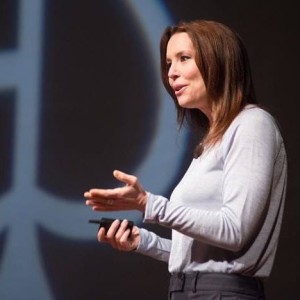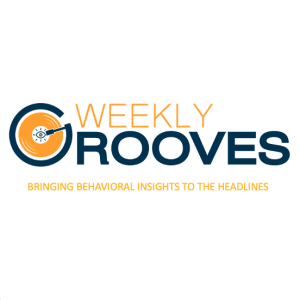
Stories, science and secrets from the world’s brightest thought-leaders. Behavioral Grooves is the podcast that satisfies your curiosity of why we do what we do. Explanations of human behavior that will improve your relationships, your wellbeing, and your organization by helping you find your groove.
Episodes

Sunday Mar 29, 2020
Deborah Small, PhD: Processing Probabilistic Events and Making Donations
Sunday Mar 29, 2020
Sunday Mar 29, 2020
Deborah Small, PhD is a professor of marketing in the Wharton School at the University of Pennsylvania. Her research crosses the intersections of psychology and economics, examining fundamental processes that underlie human decision making. In recent years, her work has focused on both altruistic and self-interested motivations for philanthropic behavior. She has examined impediments to effective altruism, bragging about prosocial behavior, and the downsides of conspicuous consumption.
A NOTE TO OUR LISTENERS: We recorded this discussion with Deborah on March 6, 2020, and it was one of the last recordings that Kurt and Tim made in the studio together. On that day, the United States confirmed 311 cases of coronavirus out of roughly 100,000 worldwide. While we were all aware of the virus, the World Health Organization had not labeled it a pandemic, which happened on March 11th. At a little after the 26:00-minute mark, we discuss what was going on as “unfolding,” as it was at that time.
Our conversation with Deborah was filled with terrific insights as we pursued inquiries such as how difficult it is for humans to deal with probabilistic events, citing examples of the coronavirus (COVID-19) and the 9/11 tragedies from 2001.
She shared highlights from her research on why people give to charities, the effects of availability bias on our behaviors, the influence of social norms in giving, and how we feel when we hear of boasting and bragging from people who make donations.
She also asked a really good question that is worth considering: Why do so many people make cash donations to charities that are terribly inefficient with their funds?
We hope you enjoy our conversation with Dr. Deborah Small.
© 2020 Behavioral Grooves
Links
Deborah Small, PhD: https://marketing.wharton.upenn.edu/profile/deborahs/
Peter Singer, PhD: https://en.wikipedia.org/wiki/Peter_Singer
The Effective Altruism Movement: https://www.effectivealtruism.org/
Jeremy Bentham: https://en.wikipedia.org/wiki/Jeremy_Bentham
“Dread Risk, September 11, and Fatal Traffic Accidents” by Gerg Gigerenzer, PhD: https://journals.sagepub.com/doi/abs/10.1111/j.0956-7976.2004.00668.x
Robert Cialdini, PhD on Ego or Altruism: https://www.jstor.org/stable/1449244?seq=1
Susan G. Komen article: https://www.usatoday.com/story/money/personalfinance/2017/10/03/breast-cancer-charity-ratings-julia-louis-dreyfus/714899001/
GiveWell: https://www.givewell.org/charities/top-charities
Common Biases & Heuristics: https://docs.google.com/document/d/1XHpBr0VFcaT8wIUpr-9zMIb79dFMgOVFRxIZRybiftI/edit#
Neuromarketing World Forum: https://www.neuromarketingworldforum.com/
Roger Dooley: https://behavioralgrooves.com/episode/roger-dooley-friction-and-engagement/
Musical Links
Taylor Swift: https://www.youtube.com/watch?v=F3aXpa1rQEY
Hamilton: https://www.youtube.com/watch?v=b5VqyCQV1Tg
Frozen II: https://www.youtube.com/watch?v=gIOyB9ZXn8s
Baby Shark: https://www.youtube.com/watch?v=XqZsoesa55w
“We Are The World”: https://en.wikipedia.org/wiki/We_Are_the_World#Humanitarian_aid
James Taylor: https://www.youtube.com/watch?v=vbeQqteag_k

Saturday Mar 28, 2020
Covid-19 Crisis: Rodd Wagner on The Zen of Staying Safe
Saturday Mar 28, 2020
Saturday Mar 28, 2020
Rodd Wagner is a Forbes columnist and bestselling author of books on leadership, employee engagement and collaboration. Rodd’s books have been published in 10 languages and his articles have appeared in The Wall Street Journal, Harvard Business Review, Fast Company, USA Today, ABC News, as well as Globe and Mail in Canada. One of his books was even parodied in Dilbert.
In our conversation, we discussed how humans perceive risk, regulation (by the self and by the government), and cumulative probabilities. We’ve known Rodd for many years and always find his perspectives fresh and ripe with curiosity. We were glad to talk with him and hope you find it as insightful as we did.
Also, we were struck by a couple of snappy phrases from Rodd that we hope become more common in our lexicon as our language evolves with the crisis: “The virus doesn’t care,” is a phrase Rodd shared that simply caught us off guard with brutal truth; and, “We are usually killed by things we didn’t see coming.” Gnaw on that for a bit as you’re washing your hands.
© 2020 Behavioral Grooves
Links
Connect with Kurt and Tim:
Kurt Nelson, PhD: @WhatMotivates e-mail: kurt@lanterngroup.com
Tim Houlihan: @THoulihan e-mail: tim@behavioralchemy.com
Lantern Group: http://lanterngroup.com/
BehaviorAlchemy: https://www.behavioralchemy.com/
Behavioral Grooves: https://behavioralgrooves.com/
Weekly Grooves: https://weeklygrooves.podbean.com/
Common Biases & Heuristics: https://docs.google.com/document/d/1XHpBr0VFcaT8wIUpr-9zMIb79dFMgOVFRxIZRybiftI/edit#
General Coronavirus Info:
Daily Newsletter Summarizing data from Johns Hopkins Center for Health Security: http://www.centerforhealthsecurity.org/newsroom/newsletters/e-newsletter-sign-up.html
CDC: https://www.cdc.gov/coronavirus/2019-ncov/index.html
Great videos on the science behind this by Dr. Peter Attia – this is the first in a series: https://www.youtube.com/watch?v=CNVhLyAlfA4
What is herd immunity? https://www.technologyreview.com/s/615375/what-is-herd-immunity-and-can-it-stop-the-coronavirus/
A list curated by Liam.Delaney@UCD.ie
https://docs.google.com/document/d/11GLhX7hLf64Bxkdpv5hvYHqOjS1imlcMQFjJBJ-9oUM/edit
Coronavirus & Behavioral Science:
Selected Links: The Behavioral Sice of Coronavirus: https://behavioralscientist.org/selected-links-the-behavioral-science-of-the-coronavirus-covid-19/
Why no one is reading your coronavirus email: https://edition.cnn.com/2020/03/13/opinions/coronavirus-emails-effective-messaging-rogers/index.html
Handwashing can stop a virus, so why don’t we do it?: https://behavioralscientist.org/handwashing-can-stop-a-virus-so-why-dont-we-do-it-coronavirus-covid-19/
The behavioral science of handwashing: https://think.ing.com/articles/the-behavioural-science-of-hand-washing/
Ideas 42: The Behavioral Side of COVID-19 here: https://ideas42.org/covid19/
Greater Good: https://twitter.com/GreaterGoodSC
How we can cope or be better during this crisis:
Tip Sheet from HUMU: https://humu.com/remote-nudges/
Resources for learning at home: https://fordhaminstitute.org/national/commentary/resources-learning-home-during-covid-19-school-closures?utm_source=join1440&utm_medium=email&utm_placement=etcetera
General Behavioral Science and other info related or talked about in the series:
Common Biases and Heuristics: https://docs.google.com/document/d/1XHpBr0VFcaT8wIUpr-9zMIb79dFMgOVFRxIZRybiftI/edit#
Jonathan Haidt – 5 Moral Foundations: https://en.wikipedia.org/wiki/Moral_foundations_theory
Jürgen Klopp: https://ftw.usatoday.com/2020/03/jurgen-klopp-goes-off-on-reporter-after-being-asked-about-coronavirus-again
UBI (Universal Basic Income): https://en.wikipedia.org/wiki/Basic_income
7-Minute Workout: https://www.youtube.com/watch?v=ECxYJcnvyMw
4 Drive Model: https://www.leadersbeacon.com/how-great-leaders-use-the-4-drive-model-to-impact-employee-motivation/
Universal Basic Income: https://behavioralscientist.org/checkscheckschecks-why-we-need-a-universal-basic-income-now-coronavirus/
Why we are not going back to normal: https://www.technologyreview.com/s/615370/coronavirus-pandemic-social-distancing-18-months/
Annie Duke’s “How To Decide”: https://www.amazon.com/How-Decide-Simple-Making-Choices/dp/0593084608

Friday Mar 27, 2020
Covid-19 Crisis: Annie Duke on Hedging and the Last Disaster Syndrome
Friday Mar 27, 2020
Friday Mar 27, 2020
Annie Duke is an author, corporate speaker, and consultant in the decision-making space. Her most recent book, Thinking in Bets: Making Smarter Decisions When You Don’t Have All the Facts, quickly became a national bestseller and landed on the Behavioral Grooves Top 10 list for 2018!
Prior to her career as a professional poker player, Annie was awarded a National Science Foundation Fellowship to study Cognitive Psychology at the University of Pennsylvania. She is the co-founder of The Alliance for Decision Education, a non-profit whose mission to improve lives by empowering students through decision skills education.
And this is Annies third time on Behavioral Grooves – you can hear her in Episode 31 and our 100th episode spectacular! Over the years that we’ve known Annie, we’ve developed a friendship that reveals itself in this episode as a very conversational exchange among friends sitting around talking about the crisis.
We talked about hedging, the Last Disaster syndrome, and of course, decision making under uncertainty. We hope you enjoy.
PS: Annie's newest book, How We Decide, can be pre-ordered on the Amazon link below.
© 2020 Behavioral Grooves
Links
Connect with Kurt and Tim:
Kurt Nelson, PhD: @WhatMotivates e-mail: kurt@lanterngroup.com
Tim Houlihan: @THoulihan e-mail: tim@behavioralchemy.com
Lantern Group: http://lanterngroup.com/
BehaviorAlchemy: https://www.behavioralchemy.com/
Behavioral Grooves: https://behavioralgrooves.com/
Weekly Grooves: https://weeklygrooves.podbean.com/
Common Biases & Heuristics: https://docs.google.com/document/d/1XHpBr0VFcaT8wIUpr-9zMIb79dFMgOVFRxIZRybiftI/edit#
General Coronavirus Info:
Daily Newsletter Summarizing data from Johns Hopkins Center for Health Security: http://www.centerforhealthsecurity.org/newsroom/newsletters/e-newsletter-sign-up.html
CDC: https://www.cdc.gov/coronavirus/2019-ncov/index.html
Great videos on the science behind this by Dr. Peter Attia – this is the first in a series: https://www.youtube.com/watch?v=CNVhLyAlfA4
What is herd immunity? https://www.technologyreview.com/s/615375/what-is-herd-immunity-and-can-it-stop-the-coronavirus/
Coronavirus & Behavioral Science:
Selected Links: The Behavioral Sice of Coronavirus: https://behavioralscientist.org/selected-links-the-behavioral-science-of-the-coronavirus-covid-19/
Why no one is reading your coronavirus email: https://edition.cnn.com/2020/03/13/opinions/coronavirus-emails-effective-messaging-rogers/index.html
Handwashing can stop a virus, so why don’t we do it?: https://behavioralscientist.org/handwashing-can-stop-a-virus-so-why-dont-we-do-it-coronavirus-covid-19/
The behavioral science of handwashing: https://think.ing.com/articles/the-behavioural-science-of-hand-washing/
How we can cope or be better during this crisis:
Tip Sheet from HUMU: https://humu.com/remote-nudges/
Resources for learning at home: https://fordhaminstitute.org/national/commentary/resources-learning-home-during-covid-19-school-closures?utm_source=join1440&utm_medium=email&utm_placement=etcetera
General Behavioral Science and other info related or talked about in the series:
Common Biases and Heuristics: https://docs.google.com/document/d/1XHpBr0VFcaT8wIUpr-9zMIb79dFMgOVFRxIZRybiftI/edit#
Jonathan Haidt – 5 Moral Foundations: https://en.wikipedia.org/wiki/Moral_foundations_theory
Jürgen Klopp: https://ftw.usatoday.com/2020/03/jurgen-klopp-goes-off-on-reporter-after-being-asked-about-coronavirus-again
UBI (Universal Basic Income): https://en.wikipedia.org/wiki/Basic_income
7-Minute Workout: https://www.youtube.com/watch?v=ECxYJcnvyMw
4 Drive Model: https://www.leadersbeacon.com/how-great-leaders-use-the-4-drive-model-to-impact-employee-motivation/
Universal Basic Income: https://behavioralscientist.org/checkscheckschecks-why-we-need-a-universal-basic-income-now-coronavirus/
Why we are not going back to normal: https://www.technologyreview.com/s/615370/coronavirus-pandemic-social-distancing-18-months/
Annie Duke’s “How To Decide”: https://www.amazon.com/How-Decide-Simple-Making-Choices/dp/0593084608

Wednesday Mar 25, 2020
Covid-19 Crisis: Ali Fenwick, PhD on Leveraging the Crisis for Good
Wednesday Mar 25, 2020
Wednesday Mar 25, 2020
Ali Fenwick, PhD is a Professor of Organizational Behavior at Hult International Business School in London and Dubai. He specializes in applying behavioural traits and behavioral interventions for business improvement, government policy design, communication effectiveness and, among other things, psychographic profiling.
According to Ali, “Bulk buying is caused by various psychological and environmental cues which throw rational-thinking out of the window. When in survival mode, we let mainly our emotions drive decisions and are more susceptible to social influences. So, we will rush out and buy more because we believe others are doing the same.”
We discussed herd behavior, how the crisis can be framed as “ours” rather than “yours” and, more importantly, the devasting effects isolation can have on the human condition. Ali outlines some terrific tips and we hope you’ll find him as engaging as we did.
(c) 2020 Behavioral Grooves
Links
Connect with Kurt and Tim:
Kurt Nelson, PhD: @WhatMotivates e-mail: kurt@lanterngroup.com
Tim Houlihan: @THoulihan e-mail: tim@behavioralchemy.com
Lantern Group: http://lanterngroup.com/
BehaviorAlchemy: https://www.behavioralchemy.com/
Behavioral Grooves: https://behavioralgrooves.com/
Weekly Grooves: https://weeklygrooves.podbean.com/
Common Biases & Heuristics: https://docs.google.com/document/d/1XHpBr0VFcaT8wIUpr-9zMIb79dFMgOVFRxIZRybiftI/edit#
General Coronavirus Info:
Daily Newsletter Summarizing data from Johns Hopkins Center for Health Security: http://www.centerforhealthsecurity.org/newsroom/newsletters/e-newsletter-sign-up.html
CDC: https://www.cdc.gov/coronavirus/2019-ncov/index.html
Great videos on the science behind this by Dr. Peter Attia – this is the first in a series: https://www.youtube.com/watch?v=CNVhLyAlfA4
What is herd immunity? https://www.technologyreview.com/s/615375/what-is-herd-immunity-and-can-it-stop-the-coronavirus/
Coronavirus & Behavioral Science:
Selected Links: The Behavioral Sice of Coronavirus: https://behavioralscientist.org/selected-links-the-behavioral-science-of-the-coronavirus-covid-19/
Why no one is reading your coronavirus email: https://edition.cnn.com/2020/03/13/opinions/coronavirus-emails-effective-messaging-rogers/index.html
Handwashing can stop a virus, so why don’t we do it?: https://behavioralscientist.org/handwashing-can-stop-a-virus-so-why-dont-we-do-it-coronavirus-covid-19/
The behavioral science of handwashing: https://think.ing.com/articles/the-behavioural-science-of-hand-washing/
How we can cope or be better during this crisis:
Tip Sheet from HUMU: https://humu.com/remote-nudges/
Resources for learning at home: https://fordhaminstitute.org/national/commentary/resources-learning-home-during-covid-19-school-closures?utm_source=join1440&utm_medium=email&utm_placement=etcetera
General Behavioral Science and other info related or talked about in the series:
Common Biases and Heuristics: https://docs.google.com/document/d/1XHpBr0VFcaT8wIUpr-9zMIb79dFMgOVFRxIZRybiftI/edit#
Jonathan Haidt – 5 Moral Foundations: https://en.wikipedia.org/wiki/Moral_foundations_theory
Jürgen Klopp: https://ftw.usatoday.com/2020/03/jurgen-klopp-goes-off-on-reporter-after-being-asked-about-coronavirus-again
UBI (Universal Basic Income): https://en.wikipedia.org/wiki/Basic_income
7-Minute Workout: https://www.youtube.com/watch?v=ECxYJcnvyMw
4 Drive Model: https://www.leadersbeacon.com/how-great-leaders-use-the-4-drive-model-to-impact-employee-motivation/
Universal Basic Income: https://behavioralscientist.org/checkscheckschecks-why-we-need-a-universal-basic-income-now-coronavirus/
Why we are not going back to normal: https://www.technologyreview.com/s/615370/coronavirus-pandemic-social-distancing-18-months/
Annie Duke’s “How To Decide”: https://www.amazon.com/How-Decide-Simple-Making-Choices/dp/0593084608

Tuesday Mar 24, 2020
Covid-19 Crisis: James Brewer on Changing His Mind
Tuesday Mar 24, 2020
Tuesday Mar 24, 2020
James Brewer is the Director of Marketing Platforms and Global Customer Operations for Eli Lilly and Company. Over the years, Kurt and Tim have worked with James on applying behavioral science insights to his work, and many of his colleagues’ work, at Eli Lilly. James is an avid behavioral science practitioner and also a friend.
We started our discussion with James about how his views have shifted from being someone who thought the media was overhyping the pandemic, to being someone who is taking the threat from the coronavirus very seriously. This naturally integrated James’s personal story of being a life-long learner and how he approaches new information.
We also discussed some of the potentially unintended consequences of the pandemic – which might include better cleanliness habits for many people – and James’ optimistic take on the future that lies on the other side of the pandemic.
Links
Connect with Kurt and Tim:
Kurt Nelson, PhD: @WhatMotivates e-mail: kurt@lanterngroup.com
Tim Houlihan: @THoulihan e-mail: tim@behavioralchemy.com
Lantern Group: http://lanterngroup.com/
BehaviorAlchemy: https://www.behavioralchemy.com/
Behavioral Grooves: https://behavioralgrooves.com/
Weekly Grooves: https://weeklygrooves.podbean.com/
Common Biases & Heuristics: https://docs.google.com/document/d/1XHpBr0VFcaT8wIUpr-9zMIb79dFMgOVFRxIZRybiftI/edit#
General Coronavirus Info:
Daily Newsletter Summarizing data from Johns Hopkins Center for Health Security: http://www.centerforhealthsecurity.org/newsroom/newsletters/e-newsletter-sign-up.html
CDC: https://www.cdc.gov/coronavirus/2019-ncov/index.html
Great videos on the science behind this by Dr. Peter Attia – this is the first in a series: https://www.youtube.com/watch?v=CNVhLyAlfA4
What is herd immunity? https://www.technologyreview.com/s/615375/what-is-herd-immunity-and-can-it-stop-the-coronavirus/
Coronavirus & Behavioral Science:
Selected Links: The Behavioral Sice of Coronavirus: https://behavioralscientist.org/selected-links-the-behavioral-science-of-the-coronavirus-covid-19/
Why no one is reading your coronavirus email: https://edition.cnn.com/2020/03/13/opinions/coronavirus-emails-effective-messaging-rogers/index.html
Handwashing can stop a virus, so why don’t we do it?: https://behavioralscientist.org/handwashing-can-stop-a-virus-so-why-dont-we-do-it-coronavirus-covid-19/
The behavioral science of handwashing: https://think.ing.com/articles/the-behavioural-science-of-hand-washing/
How we can cope or be better during this crisis:
Tip Sheet from HUMU: https://humu.com/remote-nudges/
Resources for learning at home: https://fordhaminstitute.org/national/commentary/resources-learning-home-during-covid-19-school-closures?utm_source=join1440&utm_medium=email&utm_placement=etcetera
General Behavioral Science and other info related or talked about in the series:
Common Biases and Heuristics: https://docs.google.com/document/d/1XHpBr0VFcaT8wIUpr-9zMIb79dFMgOVFRxIZRybiftI/edit#
Jonathan Haidt – 5 Moral Foundations: https://en.wikipedia.org/wiki/Moral_foundations_theory
Jürgen Klopp: https://ftw.usatoday.com/2020/03/jurgen-klopp-goes-off-on-reporter-after-being-asked-about-coronavirus-again
UBI (Universal Basic Income): https://en.wikipedia.org/wiki/Basic_income
7-Minute Workout: https://www.youtube.com/watch?v=ECxYJcnvyMw
4 Drive Model: https://www.leadersbeacon.com/how-great-leaders-use-the-4-drive-model-to-impact-employee-motivation/
Universal Basic Income: https://behavioralscientist.org/checkscheckschecks-why-we-need-a-universal-basic-income-now-coronavirus/
Why we are not going back to normal: https://www.technologyreview.com/s/615370/coronavirus-pandemic-social-distancing-18-months/

Monday Mar 23, 2020
Covid-19 Crisis: Don’t Outsource Your Critical Thinking with Christian Hunt
Monday Mar 23, 2020
Monday Mar 23, 2020
Christian Hunt is the founder of Human Risk, a Behavioral Science consulting and training firm specializing in risk, compliance, conduct & culture. Previously, Christian was the head of Behavioral Science at UBS and Chief Operating Officer of the Prudential Regulation Authority. He is an expert on risk and how people perceive risk.
We wanted to talk to Christian about how we perceive risk and whether or not our human biases are overblowing (or undervaluing) the current pandemic. We also chatted about a concept introduced to us by Deborah Small, a professor at Wharton, called distorted risk perception.
And Christian reminded us of one of the most important things to do, now more than ever: the best way to stop spreading the fake news virus is by leveraging our System 2 thinking. Be critical. Be skeptical of the sources of the material you’re reading and hearing. In sum: don’t outsource your critical thinking.
© 2020 Behavioral Grooves
Links
Connect with Kurt and Tim:
Kurt Nelson, PhD: @WhatMotivates e-mail: kurt@lanterngroup.com
Tim Houlihan: @THoulihan e-mail: tim@behavioralchemy.com
Lantern Group: http://lanterngroup.com/
BehaviorAlchemy: https://www.behavioralchemy.com/
Behavioral Grooves: https://behavioralgrooves.com/
Weekly Grooves: https://weeklygrooves.podbean.com/
Common Biases & Heuristics: https://docs.google.com/document/d/1XHpBr0VFcaT8wIUpr-9zMIb79dFMgOVFRxIZRybiftI/edit#
General Coronavirus Info:
Daily Newsletter Summarizing data from Johns Hopkins Center for Health Security: http://www.centerforhealthsecurity.org/newsroom/newsletters/e-newsletter-sign-up.html
CDC: https://www.cdc.gov/coronavirus/2019-ncov/index.html
Great videos on the science behind this by Dr. Peter Attia – this is the first in a series: https://www.youtube.com/watch?v=CNVhLyAlfA4
What is herd immunity? https://www.technologyreview.com/s/615375/what-is-herd-immunity-and-can-it-stop-the-coronavirus/
Coronavirus & Behavioral Science:
Selected Links: The Behavioral Sice of Coronavirus: https://behavioralscientist.org/selected-links-the-behavioral-science-of-the-coronavirus-covid-19/
Why no one is reading your coronavirus email: https://edition.cnn.com/2020/03/13/opinions/coronavirus-emails-effective-messaging-rogers/index.html
Handwashing can stop a virus, so why don’t we do it?: https://behavioralscientist.org/handwashing-can-stop-a-virus-so-why-dont-we-do-it-coronavirus-covid-19/
The behavioral science of handwashing: https://think.ing.com/articles/the-behavioural-science-of-hand-washing/
How we can cope or be better during this crisis:
Tip Sheet from HUMU: https://humu.com/remote-nudges/
Resources for learning at home: https://fordhaminstitute.org/national/commentary/resources-learning-home-during-covid-19-school-closures?utm_source=join1440&utm_medium=email&utm_placement=etcetera
General Behavioral Science and other info related or talked about in the series:
Common Biases and Heuristics: https://docs.google.com/document/d/1XHpBr0VFcaT8wIUpr-9zMIb79dFMgOVFRxIZRybiftI/edit#
Jonathan Haidt – 5 Moral Foundations: https://en.wikipedia.org/wiki/Moral_foundations_theory
Jürgen Klopp: https://ftw.usatoday.com/2020/03/jurgen-klopp-goes-off-on-reporter-after-being-asked-about-coronavirus-again
UBI (Universal Basic Income): https://en.wikipedia.org/wiki/Basic_income
7-Minute Workout: https://www.youtube.com/watch?v=ECxYJcnvyMw
4 Drive Model: https://www.leadersbeacon.com/how-great-leaders-use-the-4-drive-model-to-impact-employee-motivation/
Universal Basic Income: https://behavioralscientist.org/checkscheckschecks-why-we-need-a-universal-basic-income-now-coronavirus/
Why we are not going back to normal: https://www.technologyreview.com/s/615370/coronavirus-pandemic-social-distancing-18-months/

Sunday Mar 22, 2020
Covid-19 Crisis: Barry Ritholtz on Keeping Perspective
Sunday Mar 22, 2020
Sunday Mar 22, 2020
Barry Ritholtz is the CIO of Ritholtz Wealth Management and the host of the Bloomberg podcast Masters in Business, where he talks almost as much about markets, investing and business as he does about the behavioral science behind WHY we do what we do. Our first conversation appears in the ever-popular Episode 47.
This week, we discussed the financial implications of the financial crisis resulting from the pandemic. It’s not, as Barry notes quite clearly, a one hundred year flood. The market is reacting the way it normally does. While the shifts are dramatic, they were unforeseen and will – over time – return to more stable growth.
We also talked about the impact the crisis will have on supply chains, the availability of durable and consumer goods, the way bailouts should be structured, and how important it is to not lie to ourselves in times like these. All of this discussion of finance, as you may imagine, is through a behavioral lens.
© 2020 Behavioral Grooves
Links
Connect with Kurt and Tim:
Kurt Nelson, PhD: @WhatMotivates e-mail: kurt@lanterngroup.com
Tim Houlihan: @THoulihan e-mail: tim@behavioralchemy.com
Lantern Group: http://lanterngroup.com/
BehaviorAlchemy: https://www.behavioralchemy.com/
Behavioral Grooves: https://behavioralgrooves.com/
Weekly Grooves: https://weeklygrooves.podbean.com/
Common Biases & Heuristics: https://docs.google.com/document/d/1XHpBr0VFcaT8wIUpr-9zMIb79dFMgOVFRxIZRybiftI/edit#
General Coronavirus Info:
Daily Newsletter Summarizing data from Johns Hopkins Center for Health Security: http://www.centerforhealthsecurity.org/newsroom/newsletters/e-newsletter-sign-up.html
CDC: https://www.cdc.gov/coronavirus/2019-ncov/index.html
Great videos on the science behind this by Dr. Peter Attia – this is the first in a series: https://www.youtube.com/watch?v=CNVhLyAlfA4
What is herd immunity? https://www.technologyreview.com/s/615375/what-is-herd-immunity-and-can-it-stop-the-coronavirus/
Coronavirus & Behavioral Science:
Selected Links: The Behavioral Sice of Coronavirus: https://behavioralscientist.org/selected-links-the-behavioral-science-of-the-coronavirus-covid-19/
Why no one is reading your coronavirus email: https://edition.cnn.com/2020/03/13/opinions/coronavirus-emails-effective-messaging-rogers/index.html
Handwashing can stop a virus, so why don’t we do it?: https://behavioralscientist.org/handwashing-can-stop-a-virus-so-why-dont-we-do-it-coronavirus-covid-19/
The behavioral science of handwashing: https://think.ing.com/articles/the-behavioural-science-of-hand-washing/
How we can cope or be better during this crisis:
Tip Sheet from HUMU: https://humu.com/remote-nudges/
Resources for learning at home: https://fordhaminstitute.org/national/commentary/resources-learning-home-during-covid-19-school-closures?utm_source=join1440&utm_medium=email&utm_placement=etcetera
General Behavioral Science and other info related or talked about in the series:
Common Biases and Heuristics: https://docs.google.com/document/d/1XHpBr0VFcaT8wIUpr-9zMIb79dFMgOVFRxIZRybiftI/edit#
Jonathan Haidt – 5 Moral Foundations: https://en.wikipedia.org/wiki/Moral_foundations_theory
Jürgen Klopp: https://ftw.usatoday.com/2020/03/jurgen-klopp-goes-off-on-reporter-after-being-asked-about-coronavirus-again
UBI (Universal Basic Income): https://en.wikipedia.org/wiki/Basic_income
7-Minute Workout: https://www.youtube.com/watch?v=ECxYJcnvyMw
4 Drive Model: https://www.leadersbeacon.com/how-great-leaders-use-the-4-drive-model-to-impact-employee-motivation/
Universal Basic Income: https://behavioralscientist.org/checkscheckschecks-why-we-need-a-universal-basic-income-now-coronavirus/
Why we are not going back to normal: https://www.technologyreview.com/s/615370/coronavirus-pandemic-social-distancing-18-months/

Saturday Mar 21, 2020
Covid-19 Crisis: Emotional Impact of WFH with Liz Fosslien
Saturday Mar 21, 2020
Saturday Mar 21, 2020
Liz Fosslien was our guest on Episode 56 and we asked her back to kick off our series on the behavioral aspects of how life is changing with quarantines, sheltering in place and working from home. Liz is the Head of Content at HUMU, a firm that combines people science and machine learning to create breakthroughs on a wide variety of people-centric measurements. Liz is also the co-author and illustrator of No Hard Feelings: The Secret Power of Embracing Emotions at Work.
We discussed how this crisis has impacted our emotional wellbeing and how to get along while working from home (WFH). Liz shared many insights and reinforced how working from home limits the informal bump-ins we traditionally get at work, and how to manage them in a digital world.
Links
Connect with Kurt and Tim:
Kurt Nelson, PhD: @WhatMotivates e-mail: kurt@lanterngroup.com
Tim Houlihan: @THoulihan e-mail: tim@behaioralchemy.com
Lantern Group: http://lanterngroup.com/
BehaviorAlchemy: https://www.behavioralchemy.com/
Behavioral Grooves: https://behavioralgrooves.com/
Weekly Grooves: https://weeklygrooves.podbean.com/
General Coronavirus Info:
Daily Newsletter Summarizing data from Johns Hopkins Center for Health Security: http://www.centerforhealthsecurity.org/newsroom/newsletters/e-newsletter-sign-up.html
CDC: https://www.cdc.gov/coronavirus/2019-ncov/index.html
Great videos on the science behind this by Dr. Peter Attia – this is the first in a series: https://www.youtube.com/watch?v=CNVhLyAlfA4
What is herd immunity? https://www.technologyreview.com/s/615375/what-is-herd-immunity-and-can-it-stop-the-coronavirus/
Coronavirus & Behavioral Science:
Selected Links: The Behavioral Sice of Coronavirus: https://behavioralscientist.org/selected-links-the-behavioral-science-of-the-coronavirus-covid-19/
Why no one is reading your coronavirus email: https://edition.cnn.com/2020/03/13/opinions/coronavirus-emails-effective-messaging-rogers/index.html
Handwashing can stop a virus, so why don’t we do it?: https://behavioralscientist.org/handwashing-can-stop-a-virus-so-why-dont-we-do-it-coronavirus-covid-19/
The behavioral science of handwashing: https://think.ing.com/articles/the-behavioural-science-of-hand-washing/
How we can cope or be better during this crisis:
Tip Sheet from HUMU: https://humu.com/remote-nudges/
Resources for learning at home: https://fordhaminstitute.org/national/commentary/resources-learning-home-during-covid-19-school-closures?utm_source=join1440&utm_medium=email&utm_placement=etcetera
General Behavioral Science and other info related or talked about in the series:
Common Biases and Heuristics: https://docs.google.com/document/d/1XHpBr0VFcaT8wIUpr-9zMIb79dFMgOVFRxIZRybiftI/edit#
Jonathan Haidt – 5 Moral Foundations: https://en.wikipedia.org/wiki/Moral_foundations_theory
Jürgen Klopp: https://ftw.usatoday.com/2020/03/jurgen-klopp-goes-off-on-reporter-after-being-asked-about-coronavirus-again
UBI (Universal Basic Income): https://en.wikipedia.org/wiki/Basic_income
7-Minute Workout: https://www.youtube.com/watch?v=ECxYJcnvyMw
4 Drive Model: https://www.leadersbeacon.com/how-great-leaders-use-the-4-drive-model-to-impact-employee-motivation/
Universal Basic Income: https://behavioralscientist.org/checkscheckschecks-why-we-need-a-universal-basic-income-now-coronavirus/
Why we are not going back to normal: https://www.technologyreview.com/s/615370/coronavirus-pandemic-social-distancing-18-months/

Tuesday Mar 17, 2020
Managing Coronavirus - An Introduction to Weekly Grooves
Tuesday Mar 17, 2020
Tuesday Mar 17, 2020
This is an episode originally produced for Weekly Grooves. We hope you enjoy!
Coronavirus and the disease it’s created – Covid-19 – is alive and well and getting stronger every day. How bad is it? It’s difficult to say with any certainty in part because it’s constantly changing and it’s very complex. However, when presented with ambiguous information, our minds draw conclusions based on our biases and the decision-making heuristics our ancient brains rely on.
In this episode, Kurt and Tim discuss an article by friend and leading behavioral scientist, Michael Hallsworth, PhD. Michael leads the North American Behavioural Insights Team and knows a thing or two about behavior change.
In this article, Michael talks about what behavioral science hacks can be applied to reduce the spread of the virus and, hence, Covid-19.
Links
“Handwashing can stop a virus – so why don’t we do it?” by Michael Hallsworth, PhD: https://behavioralscientist.org/handwashing-can-stop-a-virus-so-why-dont-we-do-it-coronavirus-covid-19/
Effective Hand Washing: https://tinyurl.com/to4gpsw
Doctors Hand Hygiene plummets unless they know they are being watched: https://abcnews.go.com/Health/doctors-hand-hygiene-plummets-watched-study-finds/story?id=39737505
The long history of the hand-washing gender gap: https://slate.com/technology/2020/02/women-hand-washing-more-than-men-why-coronavirus.html
“Experimental Pretesting of Hand-washing interventions in a natural setting,” by Gaby Judah, PhD, et al.: https://ajph.aphapublications.org/doi/pdfplus/10.2105/AJPH.2009.164160
“Risk and Morality: Three Framing Devices,” by John Adams, PhD: https://citeseerx.ist.psu.edu/viewdoc/download?doi=10.1.1.169.4608&rep=rep1&type=pdf
When-Then Statements: https://www.understood.org/en/school-learning/for-educators/teaching-strategies/behavior-strategy-when-then
Temptation Bundling: https://jamesclear.com/temptation-bundling

Sunday Mar 15, 2020
Chiara Varazzani: Behavioral Science Needs More Neuroscience
Sunday Mar 15, 2020
Sunday Mar 15, 2020
Chiara Varazzani, PhD is the Principal Advisor at the Behavioral Insights Unit in the Victorian Government's Department of Premier and Cabinet in Australia. Chiara is Italian born, French-educated, and employed in Australia, adding her to the list of Italian-born behavioral scientists we’ve had on our show (Cristina Bicchieri, Francesco Gina, and Silvia Saccardo, in case you’re counting).
She blew us away with her passion for behavioral science as well as her comments about the way our brain calculates the ratio between effort and reward with dopamine and noradrenaline. It was a reminder that there is hard science behind why we do what we do. She also wondered why so much of behavioral science interventions rely on what she very passionately described as old school methods. Interesting question!
If you’re a marketer or a health care provider, Chiara has insights that prove beneficial to your work. And if you have any ideas on how to use smell in the world of sales incentives, we’d love to talk with you about that!
We also had a great exchange about music. Chiara has very wide musical interests and her playlists are bound to invite you into some wonderful, and possibly unfamiliar, artists.
Please enjoy our conversation with Chiara Varazzani.
© 2020 Behavioral Grooves
Kurt Nelson, PhD: @WhatMotivates
Tim Houlihan: @THoulihan
Links
Chiara Varazzani, PhD: https://www.linkedin.com/in/cvarazzani/
Antonio Damasio, PhD: https://en.wikipedia.org/wiki/Antonio_Damasio
FMRI: https://en.wikipedia.org/wiki/Functional_magnetic_resonance_imaging
Electroencephalogram (EEG): https://www.mayoclinic.org/tests-procedures/eeg/about/pac-20393875
Portable EEG: https://imotions.com/blog/eeg-headset-prices/
Common biases and heuristics: https://docs.google.com/document/d/1XHpBr0VFcaT8wIUpr-9zMIb79dFMgOVFRxIZRybiftI/edit#
Sleep, Rotten Eggs and Smoking Study: https://www.jneurosci.org/content/34/46/15382
BETA (Behavioral Economics Team of Australia): https://behaviouraleconomics.pmc.gov.au/
BETA Impact Report: https://behaviouraleconomics.pmc.gov.au/sites/default/files/resources/pmc-beta-impact-report-web.pdf
Dopamine: https://en.wikipedia.org/wiki/Dopamine
Noradrenaline: https://www.sciencedirect.com/topics/medicine-and-dentistry/noradrenalin
Neuromarketing World Forum: https://www.neuromarketingworldforum.com/
Michael Hallsworth & Music: https://behavioralgrooves.com/episode/michael-hallsworth-from-mindspace-to-east/
Cristina Bicchieri, PhD: https://behavioralgrooves.com/episode/cristina-bicchieri-social-norms-are-bundles-of-expectations/
Francesca Gino, PhD: https://behavioralgrooves.com/episode/francesca-gino-curiosity-and-rebellion-makes-your-career/
Silvia Saccardo, PhD: https://behavioralgrooves.com/episode/silvia-saccardo-ethics-of-decisions-and-italian-rap/
Jana Gallus, PhD: https://behavioralgrooves.com/episode/jana-gallus-the-role-of-precision-in-incentives/
James Heyman, PhD: https://behavioralgrooves.com/episode/behavioral-grooves-1-james-heyman-phd/
Musical Links
Leonard Cohen “Suzanne” with Judy Collins: https://www.youtube.com/watch?v=toEk9DaLrgs
Jacques Brel “Marieke”: https://www.youtube.com/watch?v=wfGDpzL9H7Y
Fabrizio de André “Creuza de Ma”: https://www.youtube.com/watch?v=78YNQ7zzxvQ
Antonio Vivaldi: https://en.wikipedia.org/wiki/Antonio_Vivaldi
Bombino: https://open.spotify.com/album/4gcKhaSReWjY8R5q2jMdLz?highlight=spotify:track:6p3PMnO8z1I8fPqx2j1Mkj
Trent Reznor: https://en.wikipedia.org/wiki/Trent_Reznor
Natural Born Killers Soundtrack: https://en.wikipedia.org/wiki/Natural_Born_Killers_(soundtrack)
Judy Collins: https://en.wikipedia.org/wiki/Judy_Collins
Stephen Stills “Suite: Judy Blue Eyes”: https://www.youtube.com/watch?v=kVUwrifwKrI
Tim Houlihan “Those Who Discovered the World”: https://open.spotify.com/track/1UMdtl78cXrrrRZRQ0zRSv
Tim Houlihan “Aljezur Sunrise”: https://open.spotify.com/track/1UMdtl78cXrrrRZRQ0zRSv
